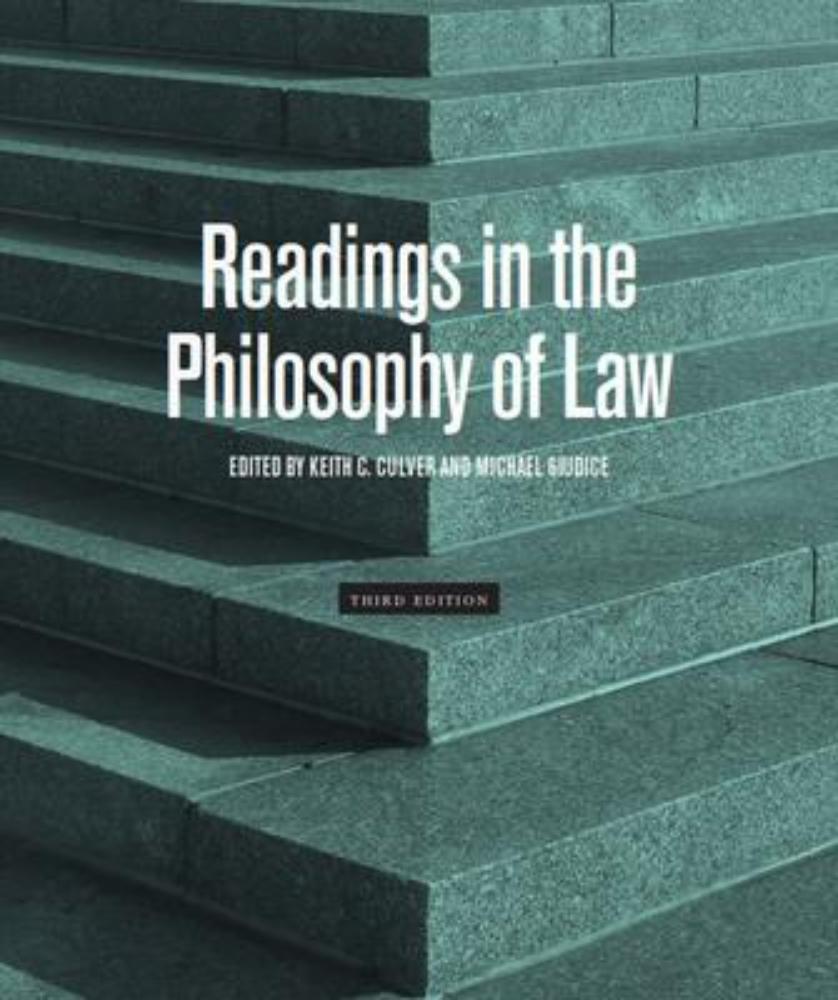
Readings In The Philosophy Of Law
A rigorous introduction to profound questions about the nature and role of law.
Readings in the Philosophy of Law brings together central texts on such topics as legal reasoning, the limits of individual liberty, responsibility and punishment, and international law. The included selections provide superb coverage of both classic and contemporary views, and are edited only lightly to allow readers to grapple with arguments in their original form. Culver and Giudice’s clear, accessible introductions discuss key terms, claims, issues, and points of connection and disagreement. Readings are placed within their historical and social contexts, with analogies and examples emphasizing the continuing relevance of the arguments at issue. This third edition is updated to take account of the rise of legal pluralism, debates over judicial review of constitutional rights, anti-terrorism laws, hate crime, and non-state law at both regional and global levels.
Acknowledgements
Preface
Introduction
Further Readings
Chapter 1: Natural Law Theory
St. Thomas Aquinas, “Treatise on Law,” Summa TheologicaJohn Finnis, from Natural Law and Natural Rights
Chapter 2: Legal Positivism
John Austin, from The Province of Jurisprudence DeterminedH.L.A. Hart “Positivism and the Separation of Law and Morals”
“Law as the Union of Primary and Secondary Rules,” from The Concept of Law
“The Foundations of a Legal System,” from The Concept of Law
Chapter 3: Integrity
Ronald Dworkin “The Model of Rules I,” from Taking Rights Seriously“Integrity in Law,” from Law’s Empire
Chapter 4: Legal Realism
Oliver Wendell Holmes, “The Path of the Law,” from The Common LawBrian Leiter, “Rethinking Legal Realism: Toward a Naturalized Jurisprudence”
Chapter 5: Recent Developments: Feminist Jurisprudence, Critical Race Theory, and Legal Pluralism
Patricia Smith, “Feminist Jurisprudence and the Nature of Law,” from Feminist JurisprudenceCatharine A. MacKinnon, “Toward Feminist Jurisprudence,” from Toward a Feminist Theory of the State
Richard Delgado, “About Your Masthead: A Preliminary Inquiry into the Compatibility of Civil Rights and Civil Liberties”
Brian Z. Tamanaha, “Looking at Micronesia for Insights about the Nature of Law and Legal Thinking”
Chapter 6: Constitutional Rights, Judicial Review, and Democracy
Jeremy Waldron, “A Right-Based Critique of Constitutional Rights”Wil Waluchow, “Constitutions as Living Trees: An Idiot Defends”
Chapter 7: Law and Limits on Individual Liberty
John Stuart Mill, from On LibertyPatrick Devlin, “Morals and the Criminal Law,” from The Enforcement of Morals
H.L.A. Hart, from Law, Liberty and Morality
Ronald Dworkin, “The Threat to Patriotism”
Chapter 8: Responsibility
H.L.A. Hart, “Postscript: Responsibility and Retribution,” from Punishment and ResponsibilityR.A. Duff, “Choice, Character, and Action,” from Criminal Attempts
Heidi Hurd, “Why Liberals Should ‘Hate Hate Crime Legislation’”
Chapter 9: The Nature of International Law
Hugo Grotius, “Prolegomena,” from De Jure Belli Ac Pacis Libri Tres (1625) in The Classics of International LawH.L.A. Hart, “lnternational Law,” from The Concept of Law
Martti Koskenniemi, “The Politics of lnternational Law”
Roger Cotterrell, “Transnational Communities and the Concept of Law”
“This is an exceptionally well-organized textbook. The editors’ introductory matter is uniformly first rate. It is a collection from which a professor could build an excellent course.” — Richard Bronaugh, University of Western Ontario
“A balanced and thorough introduction to philosophy of law that includes recent work in critical legal studies and feminism, and important material on international law. I strongly recommend it.” — Paul Hughes, University of Michigan, Dearborn
“Readings in the Philosophy of Law is an excellent textbook. The editors carefully distill central themes of legal philosophy into manageable segments without sacrificing the level of detail that makes the subject both demanding and interesting. By structuring the material around the central questions that inform, or spring from, each debate, the authors prompt students to think critically about the material presented. In my view, the mark of a great textbook is that instructors from a range of philosophical schools will be excited to use it. I think Keith Culver and Michael Giudice have achieved this elusive goal.” — Margaret Martin, author of Judging Positivism



